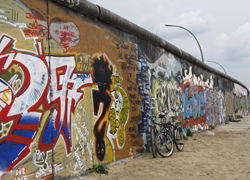 There were two notable observations regarding the German general election; firstly many are classing Chancellor Merkel’s comprehensive victory as a reward for her overall superb management of the European crisis, ensuring that domestically the German electorate didn’t suffer the ravages that so many right-wing leaning mainstream media publications predicted. Secondly, the voter turnout was circa 70%, suggesting that the German electorate is far more engaged in the political process than, for example, its UK counter-part, were turnout is generally circa 50/55%.
There were two notable observations regarding the German general election; firstly many are classing Chancellor Merkel’s comprehensive victory as a reward for her overall superb management of the European crisis, ensuring that domestically the German electorate didn’t suffer the ravages that so many right-wing leaning mainstream media publications predicted. Secondly, the voter turnout was circa 70%, suggesting that the German electorate is far more engaged in the political process than, for example, its UK counter-part, were turnout is generally circa 50/55%.
The markets haven’t reacted to the Merkel re-election for her third term in office, instead the modest rises in European equities in the morning session are more likely due to the positive PMIs published by Markit Economics…
France PMI
The monthly ‘flash’ PMI for France came in at a 19-month high 50.2, up from August’s 48.8. This is the first time it’s been above the 50-mark, which indicates growth, since the early months of last year. Markit, who conduct the research, said French industry appears to have stabilised thanks to its service sector, where growth was a 20-month high. However, manufacturing output did fall (to 49.5, worse than expected).
[quote]”The latest Flash PMI data point to stabilising business conditions in France during September. A return to expansion for the service sector counterbalanced a weaker manufacturing performance, but new business trends were broadly flat across both sectors. Employment also moved closer to stabilisation, which should help the economy remain on a firmer footing.”[/quote]
German PMI
German service sector companies, like the country’s chancellor, are enjoying a successful September. Activity has reached its highest levels witnessed since the start of this year.
The monthly ‘flash’ survey of purchasing managers just released, showed firms in Europe’s largest economy reporting stronger growth this month. This pushed the German PMI up to 53.8, up from August’s 53.5, the best reading since January.
[quote]”Germany’s economy remained firmly in recovery mode during September, and its strengthening performance should continue to reverberate across the euro area. Positive signs from the German economy are a crucial factor underpinning global business confidence at present, especially while some momentum has been lost across emerging markets. German manufacturing and services output both rose again on the back of improved new business levels during September.”[/quote]
Market snapshot at 10:30 am UK time
Asian markets experienced mixed fortunes in the overnight/early morning session; the CSI was up 1.64%, Nikkei was closed for a national holiday, whilst the Hang Seng closed down 0.56%. The ASX 200 closed down 0.46%.
European markets are mostly in positive territory in the early part of the European session; the STOXX is up 0.8%, UK FTSE flat, CAC up 0.22%, and the DAX up 0.6%.
Commodities
ICE WTI oil is flat at $104.84 per barrel, whilst NYMEX natural is down 0.49% at $3.67 per therm. Gold on COMEX is down 0.34% at $1328.00 per ounce, whilst silver on COMEX is down 0.53% at $21.81 per ounce.
Gilts
The benchmark 10-year gilt yield was at 2.92 percent in the early part of the London session after rising to 3.05 percent on Sept 11th, the highest level witnessed since July 2011. The price of the 2.25 percent bond maturing in September 2023 was 94.26.
Forex focus
Sterling rose 0.3 percent to $1.6047 early in the London session after weakening by 0.9 percent during the previous two days’ trading sessions. The U.K. currency climbed 0.3 percent to 84.25 pence per euro after appreciating to 83.53 pence on Sept 18th, the strongest level seen since Jan 17th. U.K. gross domestic product is expected to have expanded by 0.7 percent in the second quarter, when the data from the Office for National Statistics is published on Thursday. Industry reports the following day should reveal that consumer confidence and house prices in the UK both climbed in September.
The euro rose 0.1 percent to $1.3539 early in the London session after rising to $1.3569 on Sept 19th, the highest level seen since Feb 7th. It’s slipped by 0.3 percent to 134 yen. The dollar weakened 0.4 percent to 98.98 yen. The euro has strengthened 2.6 percent this year versus the greenback and 17 percent versus the yen. The euro approached a seven-month high versus the dollar after Germany’s voters put Angela Merkel on course for the biggest election win since Helmut Kohl’s 1990 ‘post-reunification’ victory.





